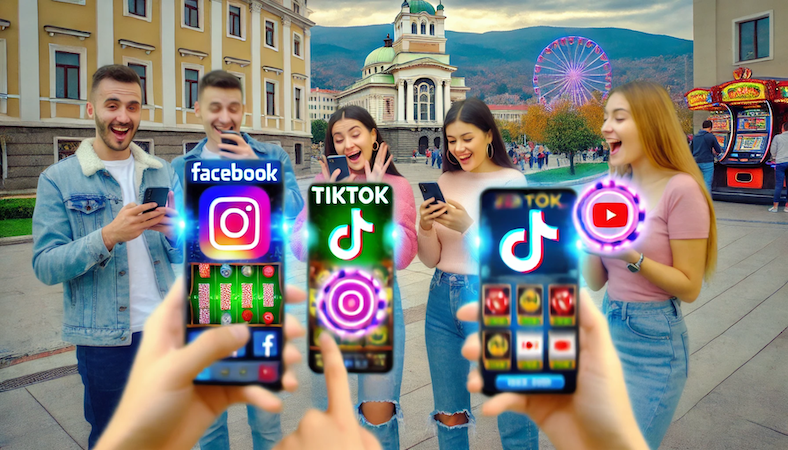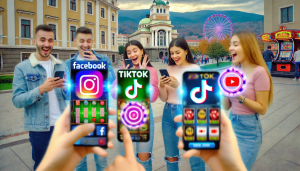In an unexpected move, the Bulgarian National Revenue Agency (NRA) recently issued a clarification on its gambling advertising rules. The agency’s position allows gambling-related content to be promoted via social media influencers, despite having imposed a broad ban on gambling advertisements in other forms of media just three months prior. This interpretation has sparked debate and raised concerns about the potential impact of such an approach on the regulation of gambling promotions in the country.
Clarification on Advertising Restrictions
The recent controversy stems from the strict limitations placed on gambling promotions across all media platforms, including online outlets. However, a document issued by NRA director Rumen Spetsov brought attention to a significant exception: the ban only applies to traditional media and their digital counterparts, while social media platforms like Facebook, Instagram, TikTok, and YouTube remain unaffected by the restrictions.
The clarification came in response to a public inquiry made by local news outlet Mediapool, seeking more specific details regarding the advertising ban’s scope. According to the NRA, social media platforms do not meet the legal definition of “media” as outlined in Bulgaria’s Broadcasting Act. The agency’s reasoning is based on the idea that users who engage with content on these platforms do so voluntarily by following influencers and creating accounts on the platforms, which implies that they have given their consent to view such content.
In defending this interpretation, Spetsov noted that each individual citizen has the right to decide what type of information they access through their social media accounts and whether or not they choose to set up such accounts in the first place.
Public Concerns and Criticism
Despite this explanation, critics have voiced concerns that the new interpretation contradicts the original intent of the law, which was designed to restrict gambling advertising across all media. The original ban, passed in May, aimed to address issues related to the growing prevalence of gambling promotions and their potential impact, especially on vulnerable groups like children who spend considerable time online.
Spetsov’s approach is rooted in a specific interpretation of the term “media,” which he defines as mass communication channels with extensive reach. He warned against attempts to circumvent the ban by using traditional media to direct audiences to social media platforms where gambling content may be promoted, emphasizing that the “editorial responsibility” regarding content on such platforms is a key factor in determining whether the advertisements are legal.
The NRA has acknowledged that enforcement of the advertising ban will be handled on a case-by-case basis, but Spetsov’s clarification suggests that gambling-related content on social media will be permitted as long as it does not appear on platforms that qualify as “media” under the law. This position means that platforms like YouTube, despite their significant reach, remain outside the scope of the ban.
I consider that social platforms such as Facebook, Twitter/X, Instagram, and TikTok are not media within the scope of the Broadcasting Act, and therefore, there is no reason to restrict them.
-Rumen Spetsov
Spetsov’s stance that platforms like Facebook, Twitter/X, Instagram, and TikTok do not meet the Broadcasting Act’s definition of media has triggered substantial criticism. Many argue that this could lead to a surge in gambling advertisements on social media, disproportionately affecting younger audiences who are most active on these platforms. Critics fear that this interpretation could dilute consumer protection efforts and result in an increase in gambling-related harm.
Potential Risks and Implications
The decision to allow gambling advertisements via influencers on social media introduces potential risks, particularly regarding younger individuals who are more vulnerable to such content. With the ambiguity in the law surrounding the definition of media, the move could potentially undermine Bulgaria’s broader efforts to reduce the impact of gambling advertisements. Furthermore, critics argue that this loophole may open the door for more aggressive gambling marketing tactics aimed at impressionable audiences.
While the NRA has stated that they will carefully evaluate individual cases, concerns remain about whether this approach will be effective in controlling the spread of gambling-related content online. The lack of restrictions on social media platforms raises questions about the long-term consequences of this decision and its potential impact on consumer protection in Bulgaria.
Gambling and Social Media in Europe
Across Europe, laws regulating gambling on social media platforms vary widely, reflecting different approaches to online gambling and advertising. For instance, in Italy, the country has taken a firm stance against gambling advertisements on social media, with a complete ban on all forms of gambling ads under the “Dignity Decree,” passed in 2019. The Italian government aims to curb gambling addiction by preventing exposure to promotional content, and this ban extends to influencers and all digital platforms. Failure to comply with these regulations can lead to significant fines for companies and individuals alike.
In contrast, the United Kingdom has adopted a more regulated approach to gambling on social media. The UK’s Gambling Commission enforces strict rules about the content of gambling advertisements, particularly ensuring that ads do not target or appeal to minors. Social media platforms and influencers must follow the Advertising Standards Authority (ASA) guidelines, which demand responsible advertising practices that clearly outline the risks of gambling. These rules have led to an increase in fines and enforcement actions against companies that fail to uphold these standards, especially when influencers promote gambling in ways that might attract younger audiences.
Meanwhile, in Sweden, the laws surrounding gambling and social media advertising have been tightened since the re-regulation of the gambling market in 2019. The Swedish Gambling Authority (SGA) closely monitors gambling advertisements on social media and enforces rules that prohibit aggressive marketing tactics. While gambling ads are still allowed, companies must ensure they are targeting appropriate age groups and avoid misleading consumers. Social media platforms are particularly scrutinized to prevent excessive exposure to gambling promotions, and companies face severe penalties if found violating these laws.


